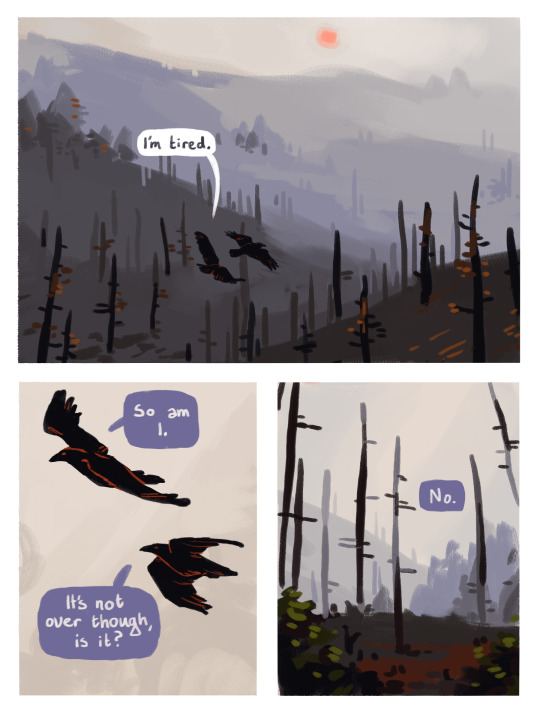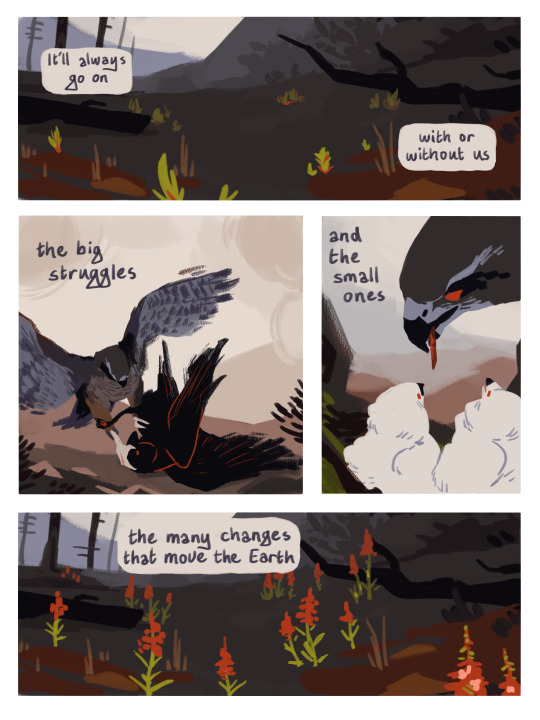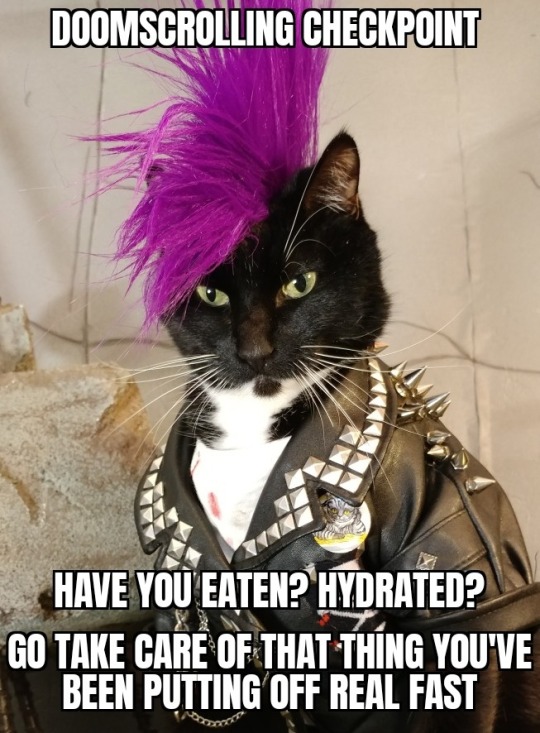Don't wanna be here? Send us removal request.
Text

I love this picture so much! Post it whenever I come across it.
29K notes
·
View notes
Text

Bathing in Moonlight - Andy Lovell
British, b. 1964 -
Silkscreen , 42 x 60 cm . 17 x 24 in. E d. 14
12K notes
·
View notes
Text

Unknown terra cotta figure of Babylonian Demon, (wall case 33.22, 458 British Museum).
211 notes
·
View notes
Text
Listening to this, I immediately thought of melting - I am losing my structure into sorrow. Today, everything and everyone feels far away and strange. Perhaps I have been melted into a marble. Perhaps everyone has - all the better to roll you down our runs, my dear; sort you all into neat piles by color and size and shape.
But how do I turn back into my not-a-marble self? By beating at the spherical walls. Pushing until they crack. But if there is a me inside the marble, then the marble is an egg. And I must spill out to find the world again and reconnect to it.
If I am an egg (for I am also the marble - not just trapped in it), then perhaps I am becoming something else. Perhaps many people are? But I cannot know that for sure. Perhaps this only happened to me. Perhaps only a few others. Perhaps we could be friends.
But for now, I think I want to focus on the idea of becoming something else - something that hatches out of a marble after being melted down. I don’t think I know what that is yet; I would rather end the story at the moment of committing to the push, to the fight to climb out, and see what I have become.
What am I overcoming, to have that be a satisfying ending? The marble is glass - perhaps others are looking in, shushing and reassuring me that its okay, I’m doing fine. I don’t need to break out yet. Others will handle this. I need to be rolled over there to be near marbles like me. What if I mess something up, smashing out too soon? What if I’m not ready.
Honestly I don’t even know if my muscles are strong enough to break out yet. Maybe I should wait a bit longer.
Or maybe I’ll build my muscles up by weakly pushing.
The World Became as Glass
I don't know what the noise at the very beginning is. I don't even know if it was me and not the computer being weird. I kept having recordings start with clicks and then break into actual voice midword so this time, this take, I waited around and made random noises to get the microphone live before starting this time.
(original script that I was recording from follows)
Let’s tell stories.
Last night, I was doing pretty well, to be honest. I knew things could be bad, but I thought they could be good. Sometime after dinner, I made the mistake of checking the news. It wasn’t even settled then.
And it was like the world was made of glass.
Like the world was made of glass, and behind it was a wind of malignancy and rot, a thing like the sludge you find if you leave vegetables alone too long.
I don’t know if that’s how it was for you.
And like, if a story starts with the world becoming as glass, that has to be the answer, too. I think. The story begins with the state of things, and ends with how it wants you to feel.
You don’t have to think about last night if you don’t want to. You can think about some other time. Some other story. Do tell me that story, though.
For me, the world became as glass; and so it ends, because the world is glass.
But I like to believe in hope, right?
What’s hope in your story?
In mine, it’s ... fire. It’s a fire that can burn the gunk away. And its secret comes from the way the world becomes as glass.
And like my first thought as to that secret—what’s yours, by the way?
My first thought as to that secret is that, like, we’re looking for the last glassbreaker in the world. That you can break the glass and … the malignancy behind it somehow fades.
I’m too angry for that tonight, though.
It’s a beautiful little story, to imagine that if you break the glass, the horror goes away; and if you have anxiety, if you have fear, then that’s a story that should speak to you, you know? But this wasn’t anxiety or fear from daily life. This was anxiety or fear from a horror that only comes once or twice a decade.
I don’t want to exaggerate it. To be clear. I don’t want to tell you that we’re all doomed. We’re not. But it’s also genuinely bad.
So let’s find a different story. Do you need to?
Here’s another way to tell the story of the horror, and have the answer be as glass.
That somewhere in the world is the last fire of goodness. Break the glass and set it free.
My brain, because it’s my brain, immediately says: it’s a tourist attraction. People come and look at the fire. They ooh and ahh. Because you want something ridiculous in your story, right? Something ridiculous and true.
Something that hurts but makes you laugh.
I draw on pop culture for that a lot. I think about Coney Island. I don’t even really know what that is, the name just stuck in my brain for the kind of thing I want.
There’s the last flame of goodness in the world, and it’s a tourist attraction. People walk by, eating cotton candy. They laugh at clowns. Sometimes the cotton candy gets away, it drops to the floor, and they wistfully stare after it thinking about the fading of the goodness of the world.
I like a light touch. I like the kind of melancholy you can laugh at. It’s the same as the melancholy that makes you weep, but it doesn’t hurt until you’re ready to unbox it.
Maybe there’s some seagulls?
I don’t know. You have to come back to this part after you write the end.
The end, of course, is that the fire gets set free. Everyone tried to stop this. They warned and warned the protagonist. Which I guess metaphorically means, don’t hope, but also, like, people get upset if you try to break the glass in—-
Ooh, break the glass in case of fire. Break the glass if you need fire. Yeah.
The fire gets free.
And the malignancy, I think, is like oil, right? It’s like an oil slick, spreading on the sea that is our lives. That’s part of the real evil that’s been unleashed today, although only the smallest and most already-present part. But it’s there.
And so the fire catches on that, and it burns. It’s still burning now.
I’m still looking for your story, to be clear. I’m still looking for how you processed the night, or some other night. I’m still looking for how you take that and turn it around and find the answer.
I want to hear your little bits of melancholy humor. I want to see that in the replies.
But that’s the story, right?
The rest is a bunch of editing. I like to write really short stories and really long stories. So for me, it can be just a few paragraphs, you know?
Say it with me: once upon a time …
Once upon a time, for Jane, the world became as glass. And behind that glass, pressed up against it like a starving kid against the windows of the world, a sea of rot.
…
So I do think there’s rot in the world, but I also think you have to be really careful with it in fiction. Everybody puts themselves on the side of the angels, you know? The more words for evil we have, the more people turn it into weapons for themselves. Usually against the best and most vulnerable of us.
So let’s try this again.
Once upon a time, Jane saw the world become as glass, and behind it was ...
Hm, step back a bit. Once upon a time, goodness rained down upon the world like candy. It fell in drifts and piles, like the snow, and it was sweet.
But we did not pick it up.
It was on the other side of the glass from us, a glass we let be hidden from us, and so it moldered on the hills and dales of the world, feast-grounds for the harvest-men alone.
They kept it for themselves, but they could not process it, and it began to rot.
One day, for Jane, the world became as glass; she saw through that veil of the world, but there was not goodness there but rather rot, a sea of rot, pressed up aginst the glass that was the world like a hungry child at the window. A sea of rot that had been goodness but was still desperate to get in.
“Wow,” she said. “That’s not up to code!”
I figure, the way it happened, after all, was that some regulations or other got slashed. You know. The ones that say you have to share the goodness. The ones that say you have to have drainage set up for a sea of goodness turned to rot. You’re not supposed to just pile glass haphazardly this way and that and leave candy out to rot behind.
I’m pretty sure.
I haven’t actually read most of the rules that have been cut.
There was still one bit of goodness, though, that didn’t end. One bit of goodness that burned on and on. A kind of love, a kind of hope, that was not candy but rather fire.
It burned, behind the veil of the world, and people came to look at it. They pointed at it and laughed, or showed their kids.
“This is what we could have been.”
They built a great park around it, and candy—processed, preserved, and resold by the harvest-men—well, they carried it around, and chatted, and did not think for a time about the great sea of rot behind the glass.
They warmed themselves by the light of the fire, and told themselves, this is something small.
This is something trivial and laughable and covered in the lime of passing birds.
(Birds don’t like the fire of goodness. Only a fire of world-ending wickedness burns within their hearts. But love them for it, do love them for it, for it’s still a flame.)
Jane let the long years pass before she went to see it. It was just a carnival attraction after all. And living in a world of glass and rot is tiring. She kept cutting herself on the edges of the glass wheresoever she would walk.
And when she saw it, she stopped, and stared; and her heart was in her throat, and she said, “Oh.”
Oh, she said, and knew that we were beautiful.
The sign beneath it read, “In case of fire, DO NOT BREAK GLASS.”
This is incidentally reasonable, because if there is a fire, you don’t want broken glass there too. Remember only to break the special glass that is there to break in fires rather than like any glass you want.
But Jane didn’t remember that.
She saw the sign, and scoffed, because everyone knows that’s not what it’s meant to say.
So she reached out, and took the hammer. (There was a hammer, even though nobody was supposed to break the glass. IT’s like I said, a bunch of regulations had been slashed.)
“No,” yelled the guy who owned the park. “No! My passive income!”
“No!” yelled the children passing by. “It says DO NOT BREAK GLASS!”
The birds screeched, too, but in their hearts I think that they were glad.
And she took the hammer, and struggled through the field of arms that tried to hold her back—
There was a field of arms. It was one of the other attractions. Some kind of lingering bodily autonomy sort of thing, I guess?
And struck; and raged the fire free.
And in that moment she understood that she had always seen herself on the wrong side of the glass. In that moment she understood that the fields of rot were not sealed away, but rather ever-present, a reflection, and it walked beside her.
She grasped this in that moment, as the fields of rot took flame.
She grasped this, as that pyre of goodness rose to seize the world; and was exalted in the flame;
And if it has stopped, that fire burns right to this day.
... I could do better, do more editing, smooth it into shape; but not today.
#my writing#never posted something like this on tumblr before#but I was a huge fan of hitherby dragons back in college and I cannot refuse the call now
58 notes
·
View notes
Text

Babs Pease (Scottish)
Splash (2024)
Two-block linocut print
209 notes
·
View notes
Photo
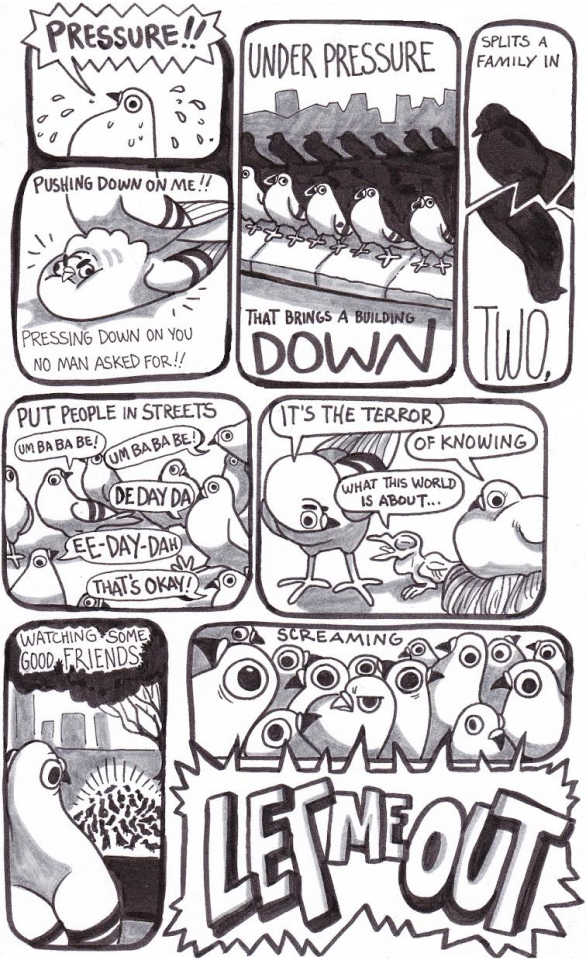
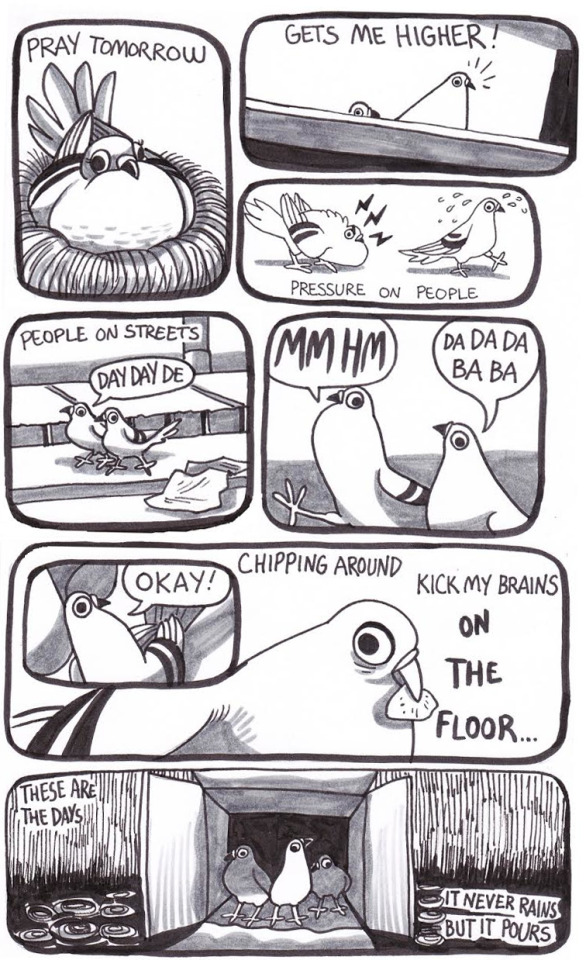

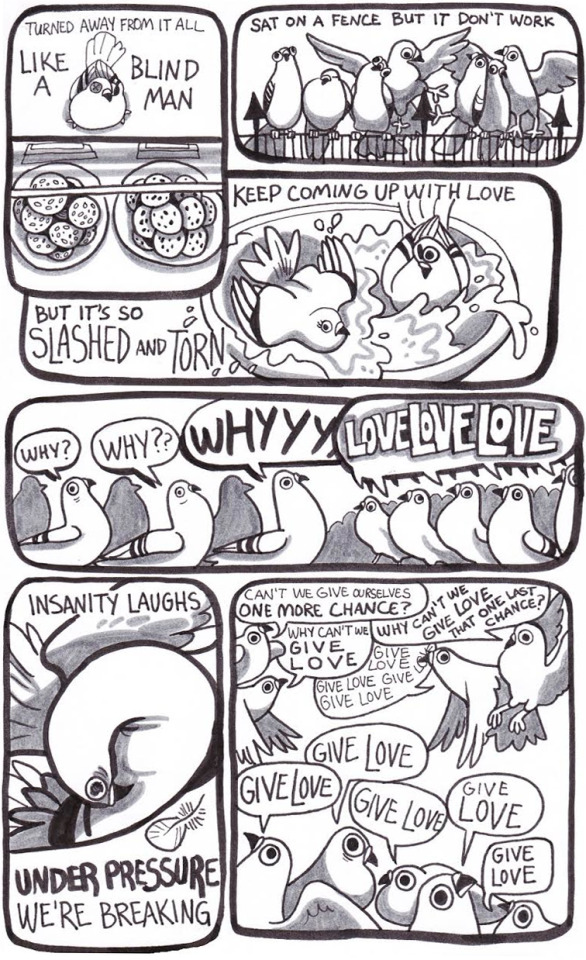

Pigeon Comic 44 - Under Pressure
Stay coo’, pigeon army.
120K notes
·
View notes
Text
so. bad news. we have to keep going tomorrow. good news is that I’ll keep going with you
125K notes
·
View notes
Text
This FB post by Rebecca Solnit is the thing keeping me sane this morning,so I’m sharing it here in case it helps you all, too:
“They want you to feel powerless and to surrender and to let them trample everything and you are not going to let them. You are not giving up, and neither am I. The fact that we cannot save everything does not mean we cannot save anything and everything we can save is worth saving. You may need to grieve or scream or take time off, but you have a role no matter what, and right now good friends and good principles are worth gathering in. Remember what you love. Remember what loves you. Remember in this tide of hate what love is. The pain you feel is because of what you love.
The Wobblies used to say don't mourn, organize, but you can do both at once and you don't have to organize right away in this moment of furious mourning. You can be heartbroken or furious or both at once; you can scream in your car or on a cliff; you can also get up tomorrow and water the flowerpots and call someone who's upset and check your equipment for going onward.
A lot of us are going to come under direct attack, and a lot of us are going to resist by building solidarity and sanctuary. Gather up your resources, the metaphysical ones that are heart and soul and care, as well as the practical ones.
People kept the faith in the dictatorships of South America in the 1970s and 1980s, in the East Bloc countries and the USSR, women are protesting right now in Iran and people there are writing poetry. There is no alternative to persevering, and that does not require you to feel good. You can keep walking whether it's sunny or raining. Take care of yourself and remember that taking care of something else is an important part of taking care of yourself, because you are interwoven with the ten trillion things in this single garment of destiny that has been stained and torn, but is still being woven and mended and washed.”
7K notes
·
View notes
Text

Poetry Comics Month, Day 5: Light
For more words and pictures check out my books POETRY COMICS and THE ART OF LIVING.
315 notes
·
View notes
Text










I love people sometimes
(Collection of Dream Tigers)
48K notes
·
View notes
